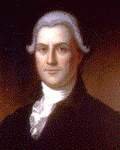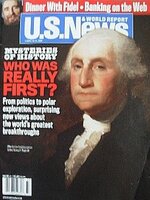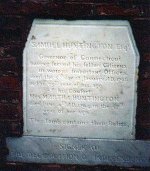pegleglooker
Bronze Member
- Jun 9, 2006
- 1,857
- 238
- Detector(s) used
- ace 250
- Primary Interest:
- All Treasure Hunting
Hey all,
Ran into this on the net and thought you revo guys might like it. Kinda raises a lot of questions.... Don't forget the You Tube at the end.
enjoy
PLL

Samuel Huntington
First President
While president of the Continental Congress in 1781, the Articles of Confederation went into effect, making him the first president of the United States.
A Signer of the Declaration of Independence, he was born in Windham, [Windham] county, Conn., July 3, 1731; son of Nathaniel and Mehetabel (Thurston) Huntington; grandson of Deacon Joseph and Rebecca (Adgate) Huntington; great grandson of Deacon Simon and Sarah (Clark) Huntington, and great2 grandson of Simon and Margaret (Beret) Huntington, who left Norwich, England, for Massachusetts Bay in 1633 with their sons, William, Thomas Christopher and Simon, and the father dying of smallpox at sea, the mother settled in Roxborough, Massachusetts Bay colony, and married Thomas Stoughton, of Dorchester, in 1735-36.
His father was a farmer in moderate circumstances and Samuel had a limited education, worked on the farm, and learned the trade of a cooper. He did not begin serious study till he was twenty-two years old, when he learned to read the Latin language and studied law. He settled as a lawyer in Norwich, Conn., about 1758, and was married, April 17, 1761, to Martha, daughter of the Rev. Ebenezer Devotion, pastor of the church at Windham. They had no children [but did adopt, see below].

He represented the town of Norwich in the general assembly in 1764, where he opposed the stamp act. He was, however, appointed king's attorney in 1765, and held the office for several years. He was appointed associate judge of the superior court of Connecticut, and was a member of the upper house of the general assembly in 1775. He was a delegate to the Continental congress, 1776-82, signed the Declaration of Independence of July 4, 1776, and was president of the body from Sept. 28, 1779, to July 6, 1781. On retiring he received a vote of thanks "in testimony of appreciation of his conduct in the chair and in execution of public business."
In August, 1781, he resumed his seat as justice of the superior court of Connecticut and as a member of the council or upper house of the general assembly. He was re-elected a delegate to congress in May, 1782, but did not take his seat owing to the condition of his health. He was again elected in 1783 and took his seat while the congress was assembled at Princeton, N.J., serving from June 30 to November 4, and when the congress adjourned he gave formal notice of his resignation on account of continued illness. He was elected chief justice of the superior court of Connecticut in 1784; deputy-governor in 1785 and governor in 1786. He was continuously re-elected governor at the succeeding yearly elections up to the time of his death.

He received the honorary degree of A.M. from Yale in 1779 and that of LL.D. from the College of New Jersey in 1780 and from Yale in 1787. He died in Norwich, Conn., Jan. 5, 1796. BDNA
His adopted son, Dr. Mason Fitch Cogswell, was a well-known innovative surgeon. Samuel and his wife also adopted the small children of his brother, Joseph Huntington, viz Samuel [1765-1817} and Frances [1769-1837], when their mother died in 1771.
[youtube=425,350]rQbpUm5mw4A&hl[/youtube]
Ran into this on the net and thought you revo guys might like it. Kinda raises a lot of questions.... Don't forget the You Tube at the end.
enjoy
PLL

Samuel Huntington
First President
While president of the Continental Congress in 1781, the Articles of Confederation went into effect, making him the first president of the United States.
A Signer of the Declaration of Independence, he was born in Windham, [Windham] county, Conn., July 3, 1731; son of Nathaniel and Mehetabel (Thurston) Huntington; grandson of Deacon Joseph and Rebecca (Adgate) Huntington; great grandson of Deacon Simon and Sarah (Clark) Huntington, and great2 grandson of Simon and Margaret (Beret) Huntington, who left Norwich, England, for Massachusetts Bay in 1633 with their sons, William, Thomas Christopher and Simon, and the father dying of smallpox at sea, the mother settled in Roxborough, Massachusetts Bay colony, and married Thomas Stoughton, of Dorchester, in 1735-36.
His father was a farmer in moderate circumstances and Samuel had a limited education, worked on the farm, and learned the trade of a cooper. He did not begin serious study till he was twenty-two years old, when he learned to read the Latin language and studied law. He settled as a lawyer in Norwich, Conn., about 1758, and was married, April 17, 1761, to Martha, daughter of the Rev. Ebenezer Devotion, pastor of the church at Windham. They had no children [but did adopt, see below].

He represented the town of Norwich in the general assembly in 1764, where he opposed the stamp act. He was, however, appointed king's attorney in 1765, and held the office for several years. He was appointed associate judge of the superior court of Connecticut, and was a member of the upper house of the general assembly in 1775. He was a delegate to the Continental congress, 1776-82, signed the Declaration of Independence of July 4, 1776, and was president of the body from Sept. 28, 1779, to July 6, 1781. On retiring he received a vote of thanks "in testimony of appreciation of his conduct in the chair and in execution of public business."
In August, 1781, he resumed his seat as justice of the superior court of Connecticut and as a member of the council or upper house of the general assembly. He was re-elected a delegate to congress in May, 1782, but did not take his seat owing to the condition of his health. He was again elected in 1783 and took his seat while the congress was assembled at Princeton, N.J., serving from June 30 to November 4, and when the congress adjourned he gave formal notice of his resignation on account of continued illness. He was elected chief justice of the superior court of Connecticut in 1784; deputy-governor in 1785 and governor in 1786. He was continuously re-elected governor at the succeeding yearly elections up to the time of his death.

He received the honorary degree of A.M. from Yale in 1779 and that of LL.D. from the College of New Jersey in 1780 and from Yale in 1787. He died in Norwich, Conn., Jan. 5, 1796. BDNA
His adopted son, Dr. Mason Fitch Cogswell, was a well-known innovative surgeon. Samuel and his wife also adopted the small children of his brother, Joseph Huntington, viz Samuel [1765-1817} and Frances [1769-1837], when their mother died in 1771.
[youtube=425,350]rQbpUm5mw4A&hl[/youtube]
Upvote
0




